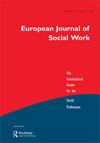国际社会工作和强迫移徙:非洲、阿拉伯和欧洲国家的事态发展
IF 1.6
3区 社会学
Q2 SOCIAL WORK
引用次数: 1
摘要
消息更容易被接受。第5章简要概述了前面的内容,并在一个集成的框架中更简洁地介绍了它们。本章的内容是政策制定者和社会工作者试图为他们的决策和反应找到科学依据的精华。第二部分通过具体案例说明,除了个人、群体和社会因素外,文化、政治、宗教和不同的国家背景也会深刻影响人们在危机中的行为。这些案例有助于限制社会工作的作用。第六章中的案例来自波兰。尽管这不是一个成功的例子,但结合第一部分的分析,我们可以直观地看到波兰在新冠肺炎防控方面失败的一些特征性原因。第7章通过分别考察伊斯兰教和印度教的例子,展示了文化和宗教对疫情控制自上而下的影响。最后一章比较和分析了29个具有代表性的经合组织国家的干预措施和流行病预防的有效性,展示了干预措施的系统数据集在支持制定应对危机的公共政策方面的潜在作用。简言之,这本书不仅将为心理学、行为科学和社会工作者的研究人员提供见解,还将为对疫情期间人类行为感兴趣的普通读者提供一幅更客观、更现实的画面,从而保护他们免受伪科学的影响。更重要的是,它可以为决策者和社会工作从业者提供潜在的短期和长期解决方案。本文章由计算机程序翻译,如有差异,请以英文原文为准。
International social work and forced migration: developments in African, Arab and European countries
messages more acceptable. Chapter 5 provides a brief overview of the previous contents and presents themmore concisely in an integrated framework. The content of this chapter is a distilled essence for policymakers and social workers trying to find a scientific basis for their decisions and responses. Part II uses specific cases to illustrate that culture, politics, religion, and different national contexts can profoundly impact people’s behaviour in a crisis besides individual, group, and social factors. These cases can help confine the aspects social work can act. The case in Chapter 6 is from Poland. Although it is not a successful example, combined with the analysis in Part I, we can visualise some characteristic reasons for the failure of Poland in COVID-19 prevention and control. Chapter 7 shows the top-down impact of culture and religion on pandemic control by examining examples from Islam and Hinduism, respectively. The final chapter compares and analyses the interventions and effectiveness of pandemic prevention in 29 representative OECD countries, demonstrating the potential role of systematic data sets on interventions to support the development of public policy responses to the crisis. In a nutshell, this book will not only provide insights for researchers in psychology, behavioural sciences, and social workers but also supply a more objective and realistic picture for the general readers interested in human behaviours during a pandemic and thus protect them from pseudoscience. More importantly, it can inspire potential short-term and long-term solutions for policymakers and social work practitioners.
求助全文
通过发布文献求助,成功后即可免费获取论文全文。
去求助
来源期刊

European Journal of Social Work
SOCIAL WORK-
CiteScore
3.50
自引率
20.00%
发文量
96
期刊介绍:
The European Journal of Social Work provides a forum for the social professions in all parts of Europe and beyond. It analyses and promotes European and international developments in social work, social policy, social service institutions, and strategies for social change by publishing refereed papers on contemporary key issues. Contributions include theoretical debates, empirical studies, research notes, country perspectives, and reviews. It maintains an interdisciplinary perspective which recognises positively the diversity of cultural and conceptual traditions in which the social professions of Europe are grounded. In particular it examines emerging European paradigms in methodology and comparative analysis.
 求助内容:
求助内容: 应助结果提醒方式:
应助结果提醒方式:


